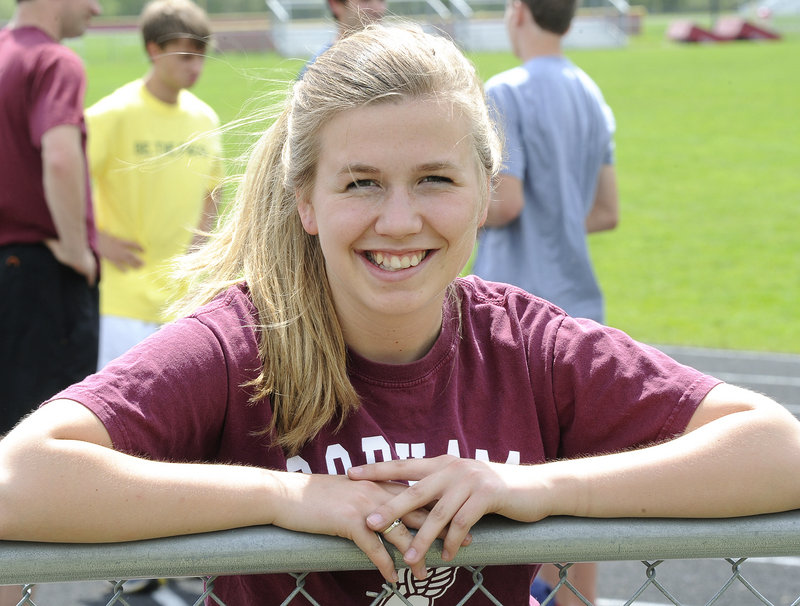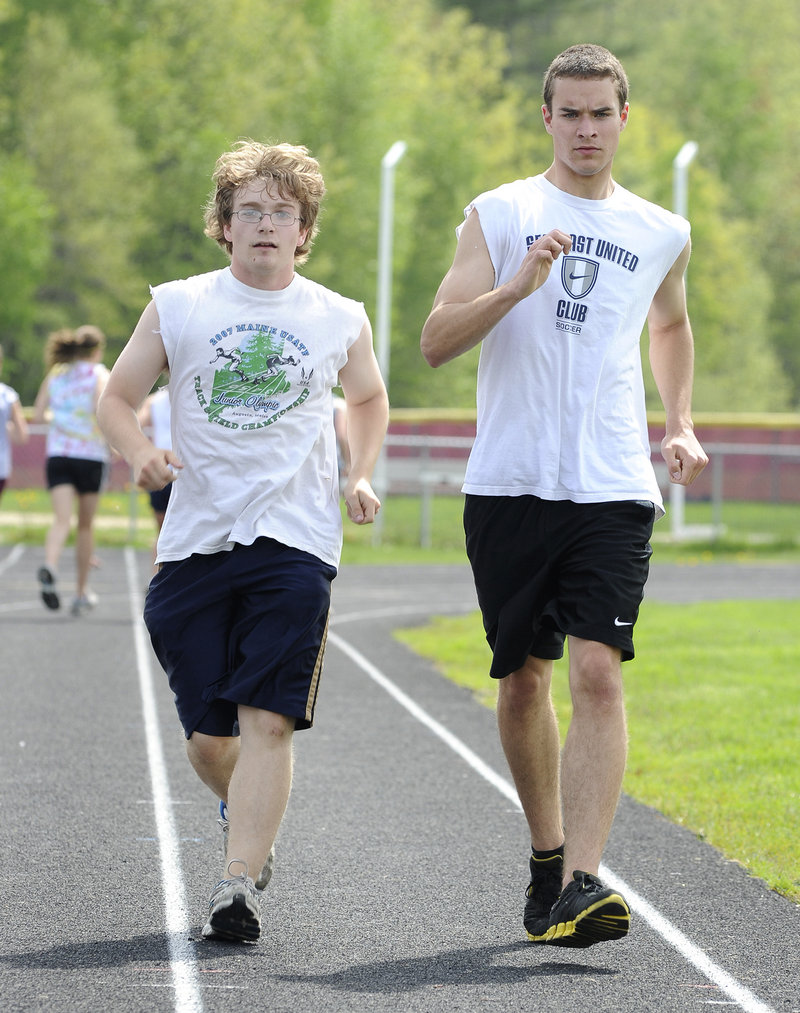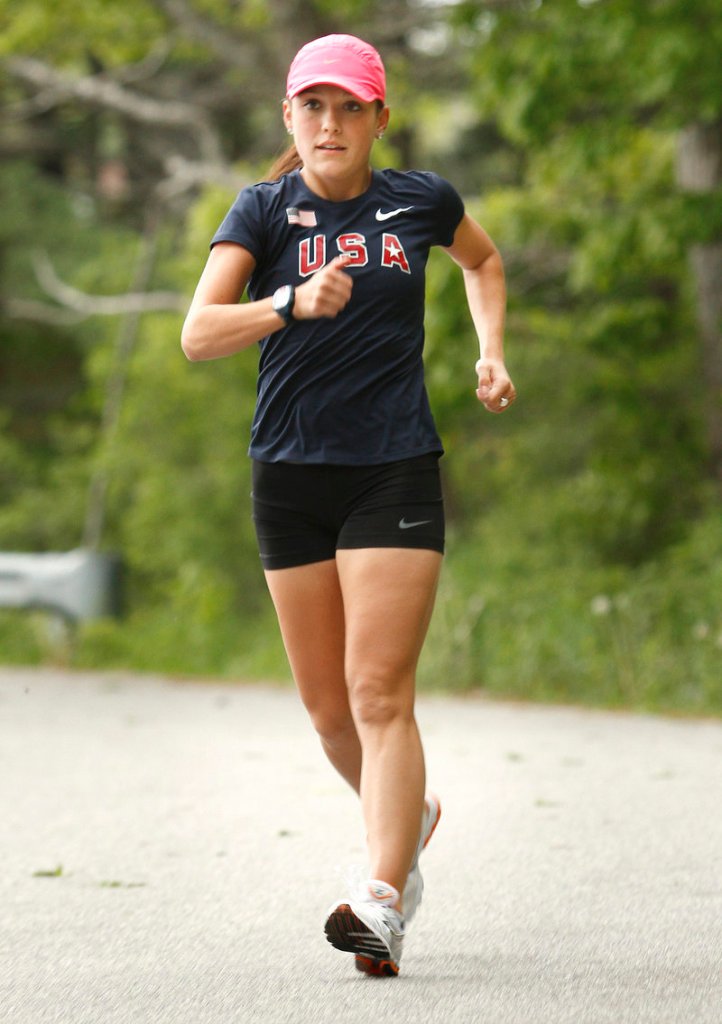GORHAM – The first time Kaitlin Flanders tried racewalking, she wasn’t sure she wanted to continue.
“I was embarrassed when I first started doing it,” she said. “You’re kind of shimmying around the race track. But you get used to it.”
That was three years ago. Now Flanders, a junior at Gorham High, is among a long list of successful racewalkers from Maine.
From the high school level, to colleges and even to the Olympics, the Pine Tree State is well represented in a sport that often has to defend itself.
“Oh, yeah,” said Flanders, who along with Edward Little’s Abby Dunn and Waterville’s Courtney Williams are among the top high school female racewalkers in the nation. “I know some people who say, ‘That’s not a sport.’ Well, I say to them, ‘You want to race?’
“People really underestimate it.”
But not, it seems, in Maine.
Farmington’s Kevin Eastler appeared in two Summer Olympic Games — 2004 in Athens and 2008 in Beijing — before retiring.
Ben Shorey of Osborn, an Ellsworth High graduate, won the U.S. 50-kilometer championships last January. Lauren Forgues of Boothbay recently won the U.S. 15K championship.
The two are considered strong contenders for berths on the U.S. Olympic team that will compete in London in 2012.
Matthew Forgues, Lauren’s younger brother, finished fourth in this year’s NAIA 5,000-meter championships.
And at the high school level, Edward Little’s Dunn, a junior, is the reigning high school racewalking female athlete of the year. She has the best time in the nation in the mile (7:28.99) and 5,000 meters (25:33.41) and has won the Penn Relays junior race three consecutive years.
“I really like the competitive aspect of it,” said Dunn. “I don’t really like running, and racewalking for me is easier. I’ve met a lot of really neat people doing it and I’ve traveled to a lot of cool places to do it.”
It’s that social aspect of the sport that seems to retain the better racewalkers. While competitive, they all admit this sport has brought them to places and people they would otherwise have never been to or met.
“When I was a junior, I went to Lima, Peru,” said Lauren Forgues. “I would have probably never gone to South America in my life if it wasn’t for racewalking. And you get to hang around with people you’ve only heard about, like Ben Shorey.
“And you get to wear a USA uniform. That’s inspiring.”
Maine’s strong showing in this non-traditional sport is no surprise. Maine is one of only two states in the nation that offer racewalking at the high school level — New York is the other — and has coaches knowledgeable in its techniques.
Tim Seaman, a racewalking coach at a small junior college in San Diego and a former rival and close friend of Kevin Eastler, said Maine’s environment is what the sport needs.
“We need to expose the great athletes to go out for it,” said Seaman, who trains Lauren Forgues. “It’s really nice that Tom Eastler was able to open up minds there and expose more athletes to it.”
Tom Eastler, Kevin’s father, is the foundation of racewalking in Maine. He began running clinics and competitions here in the 1990s, with his children becoming the first stars of the program.
He finds ways to raise money for the competitors to travel to out-of-state events. And he makes sure that anybody who wants to work at the sport gets a chance.
“We’re trying,” said Tom Menendez, a highly regarded racewalking coach in Maine. “A lot of the success is attributed to Tom and (Kevin). They set the standard there.”
Lauren Forgues, who recently returned to Maine after training with Seaman, said: “I know I owe a lot to Tom Eastler.”
But Tom Eastler said this couldn’t have happened without the help of the Maine Principals’ Association. As much as he loves the sport, it wouldn’t have become as successful as it has without the support of the state’s sanctioning body for high school sports.
“I’d like to give credit to the MPA, which very few people do,” he said. “Even though they didn’t realize what they were doing, and later tried to get rid of it, they had the good judgment to make it first a demonstration sport and then over the years, in spite of negative comments, a scoring event.
“It’s taken a long time, like anything will do,” said Eastler. “But (racewalking) has taken on big time, not only in high school but at the middle school level, too. We’re generating some athletes and some are very darn good.”
Chief among those are Shorey and Lauren Forgues. They are at the top of the nation’s best, primed for a walk into the London Olympics.
Seaman said Forgues is “a legitimate candidate for 2012. She’s a fighter. She fights with the best of them. If I tell her to do something, she does it to the best of her ability.”
The glitch now is she is back in Maine for the summer because she could not afford to stay in California to train with Seaman and his wife any longer. She hopes to make enough money to return in the fall, which Seaman said is crucial.
“She has to be out here by October for her to have a shot,” he said. “If she’s there in the winter, it’s going to be difficult. The winters there are not conducive to good training.”
And she knows that.
“Tim sets up my program, we talk all the time,” she said. “But it’s hard to train alone.”
Forgues, 23, is finally healthy after years of injuries. She competed in the 2008 Olympic trials, but stopped two kilometers shy of the 20K finish when her knee buckled. She has torn the meniscus ligament in both knees and had surgery in January.
Her goal is to get the Olympic “B” standard of 1:38:00 before next year’s trials. That would put her in good shape to achieve her ultimate goal. Based on her time in the 15K championships (1:14:14), she is currently at about a 1:39:00 pace.
“Racewalking is the one thing I’m really good at,” said Forgues. “It’s my life. I can run, but I’m not a good runner. I’ve sacrificed a lot for racewalking.”
Shorey, 28, lives and trains in Kenosha, Wis., where he is an elementary school teacher. He also trains on his own. Racewalkers don’t exactly inspire corporate sponsorships.
Originally volunteered to be a racewalker by his high school coach — in other words, he was told he’d be competing in the event — Shorey really didn’t understand how good he could be until just a couple of years ago.
He had competed in college and in the 2004 and 2008 Olympic trials, but never considered himself as an elite racewalker. In fact, after college, he walked away from the sport.
Six months before the 2008 trials, after he said he had put on “about 40 pounds” working in an office, his wife suggested he begin walking again.
That got him inspired. Now, after winning the national championship in January in 4:16:01, he has a set plan:
“My honest goal is to go to the trials with (the ‘B’ standard of 4:09:00) and be on the team and race well enough to win,” said Shorey. “The last thing I want to do is to have to make the standard at the trials.”
“Seven minutes in a 50K racewalk?” said Tom Eastler. “That can be done. Easy.”
The national championship, said Shorey, was the culmination of “a long and lonely road. It’s what I’ve been thinking about the last year and a half.”
Seaman, who finished second to Shorey in the 50K nationals, said proper training will again be essential for Shorey’s success.
“Ben is very strong mentally,” said Seaman. “If he can get in the right type of training, he can be very good.”
Tom Eastler and Tom Menendez, who is a math teacher at Monmouth Middle School, believe there are many other Mainers who can be very good.
Start with Dunn, Flanders and Williams, who often compete against each other.
“We’re all good friends,” said Gorham’s Flanders. “We just like competing together and try to push each other. If one person is having a good day and another a bad day, we try to help each other. I think we’re good teammates.”
And then there’s Gorham senior Jenn Thuotte, who has missed this season with an injury.
Jason Tanguay, the coach at Gorham, also has three talented boys: Nate Bucknell, Alex Thuotte and Ryan Baillargeon. And Maranacook’s Evan Vincent may be the best of all.
“We have a pool of young athletes who found themselves to not be top distance runners, but very receptive the discipline of racewalking,” said Tanguay. “If you put the time into it, you can be successful.”
You’ve got to enjoy it, as well.
“At first I just did it because they wanted me to do it my freshman year,” said Bucknell. “But I really enjoy it. It’s something different from what everyone else does.”
Menendez runs his summer program in Auburn and has his participants try every event. Dunn said that is how she discovered her love for the event: “It was actually one of the few things I was good at and didn’t intimidate me.”
Her success, said Menendez, stems from one thing: “Desire. It really does come down to desire.
“I tell my kids that if they work their butts off and if they follow my rules, they’ll be all right. If not, then let’s not waste our time.”
Tom Eastler said there is still work to be done in Maine. The state needs more officials and better training.
“You never want to become complacent,” said Eastler. “I always wonder if we’re doing enough. And I guess there’s a lot of evidence saying we are. Things are moving well.”
Staff Writer Mike Lowe can be contacted at 791-6422 or at:
mlowe@pressherald.com
Twitter: MikeLowePPH
Copy the Story Link
Send questions/comments to the editors.






Success. Please wait for the page to reload. If the page does not reload within 5 seconds, please refresh the page.
Enter your email and password to access comments.
Hi, to comment on stories you must . This profile is in addition to your subscription and website login.
Already have a commenting profile? .
Invalid username/password.
Please check your email to confirm and complete your registration.
Only subscribers are eligible to post comments. Please subscribe or login first for digital access. Here’s why.
Use the form below to reset your password. When you've submitted your account email, we will send an email with a reset code.